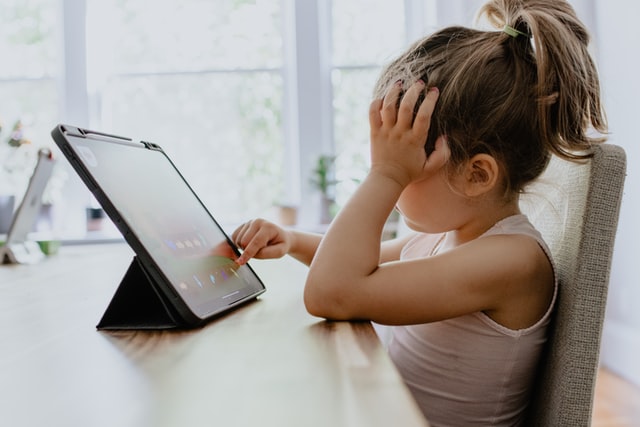Remote learning? Remote chance.
“I NEED HELP.”
“NOW I DO NOT.”
Looking at those capitalised sentences that popped up on the chat feature in my Google Classroom, I realise that the gap in privilege in education has never been more evident than it is at this moment.
The message was sent at 10:35 p.m. on a Friday, five hours after I had logged off, having just spent the last nine and a half hours literally glued to the screen of my laptop, ignoring any plea for support from my own child, who is home learning due to a class member’s positive COVID-19 result, because I feel so incredibly responsible for the education of my year group.
The success of this remote learning, I feel, falls so heavily on my shoulders.
The tasks must be accessible enough for all, yet challenging enough to engage those who will find it easy. They mustn’t be too long to lose the child’s attention, but they can’t be too short in case the parents are encouraged to complain to the Office for Standards in Education, Children’s Services and Skills (Ofsted) that their school isn’t providing four hours of learning materials. (Thanks, Education Secretary.)
And yet, I find that almost half of my class, who are learning at home, are not engaging anyway. And it’s not because they don’t want to—some of these children were my keenest classroom contributors—it’s because they can’t.
They simply do not have the means to. In a world where technology is so advanced and accessible, in a world where we are so reliant on it, we make the assumption that everyone has the means to access a computer. But a lot of the families I work with actually don’t.
Yes, parents might have a smartphone, but what if it’s on a contract and they have a capped data allowance? They might have a tablet, but what if the documents we are expecting them to use aren’t compatible for that device? They might have a laptop, but what if their parents need access to it all day because they now have to set up office at home and cannot spare the time to let their child complete a reading comprehension about the Very Hungry Crocodile?
I find myself, as a teacher, falling quickly into that last category. Yes, I do have a laptop, but it’s the one I wrote my dissertation on seven years ago. The side panel has broken off and been lost—probably kicked under the sofa at some point—so the disc drive randomly kicks in every now and then. No word of a lie, it takes at least 40 minutes to even boot the thing up and another 20 minutes for the cursor to catch up with the first word you’ve typed, so we have little hope of completing the required tasks set by my daughter’s school each day.
Yet we are by no means impoverished as a family. We run two cars, two phone contracts, pay for three separate sets of childcare and piano lessons. We just have never felt the need to replace an aging laptop we rarely ever dust off. All of my work is completed on my sleek school laptop, and my personal business is conducted through emails on my phone. Even personal thoughts, like this, are logged in my phone’s notebook feature.
Remote learning has also allowed me a glimpse into the life of the children I am used to seeing as data.
The “greater depth” child in the classroom is struggling with the most straightforward of tasks at home, and I realise it’s because English is a second language to them. Their parents cannot speak English, so without the chance to discuss the task or the spoken lesson input, they have no idea what is expected of them.
The “below” child, who struggles to read in lesson, hasn’t completed anything but the simplest of spelling tasks, which were all spelled wrong, because their dad works until 7 p.m. and their mum is too busy looking after the younger sibling to help.
The “significantly below” child hasn’t accessed anything for a week because, upon doing a home visit, they don’t even have enough money for carpet, let alone Wi-Fi.
Yet the “working toward” child flourishes because they have the one on one attention of their parent, talking and guiding them through a task they would have been left to figure out on their own in the classroom because the child with an Education, Health, and Care Plan (EHCP) started tearing up the display board again when he was asked to pick his pencil up.
I know instantly which children have had to wait for their parents to finish work before completing their tasks at 7:30 p.m., and which children will submit their work at 11 p.m. (or hopefully their parents will!) because they’ve done everything but have been cared for by grandparents all day who don’t have a clue how to upload the work. I know which children will read the feedback I’ve painstakingly written on each individual task and have another go and which children won’t.
These are challenging times in education right now, not just because of COVID though, but because I feel the point and the ideals have become lost over time with the government’s obsession with test scores and data.
As teachers, we are crazy about learning and we want nothing more than to create and nurture the next generation of life-long, passionate learners—busy, enquiring minds who thirst for knowledge and strive to know more—but we are constrained by the logistics and the boundaries of the very system we are trying to promote.
If one good thing ever comes of COVID, I hope it’s a shake-up of an outdated system that does nothing to stimulate the want and need to learn that I’m sure our children desire to have.
~







Read 3 comments and reply